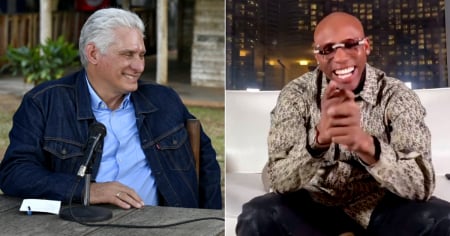The Venezuelan ruler, Nicolás Maduro, sparked controversy this Saturday by suggesting that he would use troops from Brazil to "liberate" Puerto Rico from what he termed the "colonization" by the United States.
Maduro provoked the U.S. government, inviting a possible war or armed confrontation. The statements were made during the closing of the International Antifascist World Festival, an event broadcasted by the state channel VTV that coincided with his swearing-in for a third consecutive term.
"Just as the north has a colonization agenda, we have a liberation agenda, and that agenda was written for us by Simón Bolívar. The freedom of Puerto Rico is pending, and we will achieve it, with the troops from Brazil and Abreu e Lima leading the way," affirmed Maduro.
He was referring to the Brazilian military figure José Ignacio Abreu e Lima (April 6, 1794 - March 8, 1869), who participated in key battles for Venezuela's independence under the command of Simón Bolívar.
Maduro, Cuba, and Nicaragua: Prepared to "take up arms"
In the same event, Maduro proclaimed that Venezuela, along with Cuba and Nicaragua, is ready to "take up arms" if necessary, to defend what he described as "the right to peace and sovereignty."
In his view, “no one should be mistaken about Venezuela,” as he claims that the country is prepared for both diplomacy and an armed response if circumstances demand it.
"Let no one be deceived, that scenario could present itself again," stated the Venezuelan leader, recalling the fight against fascism from 80 years ago as an example of what he considers a global effort for justice. "If it's through peaceful means, we will advance through peaceful means; but if it's through force, we will overcome that as well," he said.
Context of Maduro's statements on invading Puerto Rico
Maduro's statements come in a context of increasing international rejection of his government, especially after his self-proclamation as president following elections that were widely questioned due to irregularities and allegations of fraud.
Both the Venezuelan opposition and several foreign governments have rejected the results of the electoral process.
The speech has been met with skepticism and criticism, both inside and outside Venezuela. The opposition described the statements as "disconnected from reality" and accused Maduro of using bellicose rhetoric to divert attention from the country's internal problems.
Venezuela, like Cuba, is facing an unprecedented economic, humanitarian, and migratory crisis after decades of dictatorial rule.
International experts have noted that Maduro's claims about the "liberation" of Puerto Rico and his willingness to use force are more symbolic than practical, aiming to reinforce his narrative of confrontation against what he calls "American imperialism."
Frequently Asked Questions about Nicolás Maduro's Statements and the Situation in Venezuela
What did Nicolás Maduro propose regarding Puerto Rico?
Nicolás Maduro suggested that he would use troops from Brazil to "liberate" Puerto Rico from what he calls the "colonization" by the United States. These statements were seen as a provocation towards the U.S. government and were made during the closing of the International Anti-Fascist World Festival.
How has the international community reacted to the recent elections in Venezuela?
The international community has largely rejected the electoral process in Venezuela, labeling it as fraudulent and questioning its legitimacy. Several countries and organizations have disregarded Maduro's reelection and have called for a democratic transition, while the internal opposition has also denounced irregularities.
What relationship does Venezuela have with Cuba and Nicaragua according to Maduro's statements?
According to Nicolás Maduro, Venezuela maintains a strong alliance with Cuba and Nicaragua, asserting that they are prepared to "take up arms" if necessary to defend their sovereignty. Maduro emphasizes that these countries are ready to confront any threat that compromises their right to peace.
What are the main criticisms of Maduro's regime?
The Maduro regime has been criticized by the international community due to fraudulent elections, authoritarian handling of power, and human rights violations. The internal and external opposition accuse him of using belligerent rhetoric to divert attention from the economic and humanitarian problems facing the country.
Filed under:
